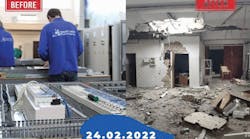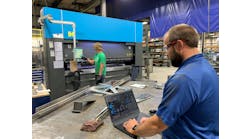System integrators often face unexpected problems, but they usually don’t have to deal with missiles and shrapnel raining down on their offices. Tragically, this is the situation system integrators, end users and everyone else in Ukraine have been dealing with since Russia started its insane invasion close to half a year ago.
For example, system integrator TeraWatt Group reports its main office and production shop in Mariupol were destroyed on Feb. 24 during attacks on the city at the beginning of the war. The company is also a founding member of the Association of Industrial Automation of Ukraine, which posted a recent interview with Anton Krotyuk, technical consultant at TeraWatt, at appau.org.ua/en/blog/terrawatt-group-as-a-company-from-mariupol-accepts-the-challenges-of-war.
“Before the invasion, our staff consisted of more than 150 process and civil engineers, 50 electrical designers and 20 software engineers, and we’ve almost completely preserved the staff we had before the war," says Krotyuk. "Most of our engineers have remained in Ukraine. However, our success with working remotely during the pandemic showed that it’s a viable option. In fact, since the start of the war, we completed about 10-15 projects of various sizes and levels of complexity. Finding new orders in Ukraine and abroad is now a priority for our company.”
These efforts are being aided by members of the Control System Integrators Association (CSIA), who met with Krotyuk and Andrey Kalantarenko, TeraWatt’s general manager, during the CSIA Executive Conference 2022 on June 27-30 in Denver. CSIA recently awarded complimentary memberships for 2022-23 to APPAU's members, and is networking with them on outsourcing opportunities.
It was gratifying to see Krotyuk and Kalantarenko network with CSIA’s members, and hear about their joint plans to collaborate and help TeraWatt’s personnel, APPAU’s members, and Ukraine’s end users and communities cope and recover. However, I also noticed how much of a departure TeraWatt, APPAU, Autoware and CSIA’s initiatives are than the usual charity events that process industry organizations and other firms participate in. Both are undoubtedly worthy, but humanitarian assistance and cooperation during wartime is obviously way more serious, and demands a far deeper commitment.
My concern is there may not be enough commitment to go around yet. Process engineers and anyone else not closely affected by the war in Ukraine and all the other international and domestic crises occurring lately may want to focus on familiar tasks instead. It seems like most of the technical professionals I’ve ever covered would rather concentrate on small, specialized and easily understandable problems, and shy away from large, difficult and uncomfortable issues. But comfy cowardice isn’t what the world needs right now. It needs engineers and other intelligent people to look up from their laptops and smart phones, and use their brains to address and solve the problems that need it most. You're smart. You know what's on the to-do list.






